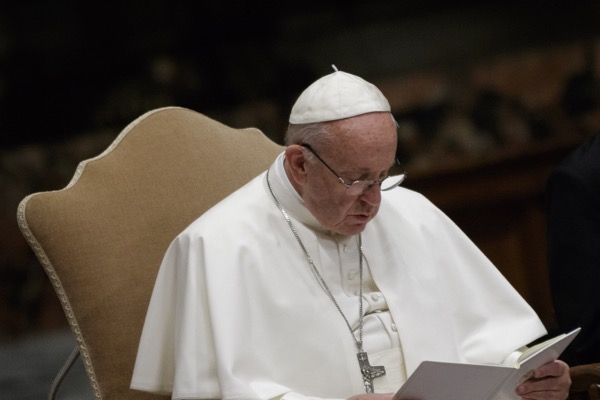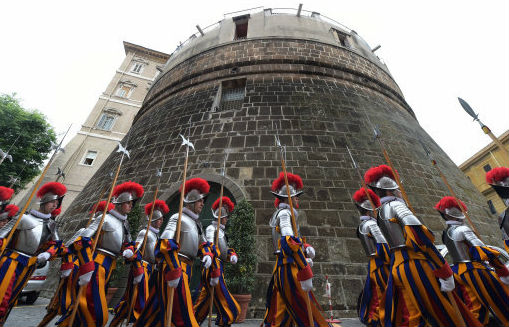A European financial watchdog has praised the Vatican for freezing suspicious transactions but stressed the Holy See must do more to prosecute those accused of laundering money.
Moneyval, an anti-money laundering agency part of the Council of Europe, today issued a 209-page report into the Holy See’s attempts to prevent money laundering arguing that processes are “working efficiently.”
But they noted that that while “considerable amounts of money” have been frozen not a single money laundering case had been brought to court nor had potentially laundered funds been confiscated.
The report pointed out that the Vatican's Financial Information Authority - the internal agency monitoring suspicious money transfers - had flagged 69 possibly problematic transactions since 2013, resulting in 27 criminal investigations being opened. Yet none of these have come to trial, and not one money laundering case has seen charges being brought.
Moneyval urged the Vatican to “actively consider appealing sentences which he considers unduly lenient” and urged the prosecutor to be more “proactive” in pursuing other financial crimes.
In a recent major case, involving the ex-president and ex-treasurer of the Vatican’s children hospital accused of embezzling €422,000 allegedly used to renovate a cardinal’s flat, the ex-president was convicted only of abuse of office and given a suspended one-year sentence while the ex-treasurer was absolved.
“While no personal enrichment of the defendants appears to have been involved, which might have triggered a confiscation order, it was noted that no application for restitution or compensation to the Foundation was made,” the report reveals. “This was queried with the HS/VCS [Holy See/Vatican City State] authorities. This review has been advised that the Promoter of Justice asked the Tribunal to impose a fine, as foreseen by the law (in addition to the custodial sentence). No financial penalty in the form of a fine was imposed and it is understood that no confiscation order was possible as the refurbished apartment was already owned by the VCS [Vatican City State].”
Other cases mentioned in the report include:
- A former priest who held an account at the Institute for the Works of Religion (IOR) - otherwise known as the Vatican bank - and was accused of bribing a bank official to open an account in the name of a third person. No charges were brought and in July 2017 the case was dismissed due to poor evidence.
- In 2011 an individual - not a Vatican resident - used safety deposit boxes to store €3.2 million and transfer them to another country without making a declaration. The Promote of Justice is investigating as a case of money laundering but so far there has been no indictment.
- Former President of a Vatican institution suspected of having sold, with the help of a notary, an asset belonging to the institution for some private benefit. The Holy See froze the accounts of the ex-president and the notary (totalling €15 million) and then made a request to an unnamed third country to freeze the notary’s assets there. Foreign authorities are investigation the notary in that jurisdiction and it appears that no crime has been committed in Vatican territory.
Moneyval praised the work of the Vatican’s information authority, led by Swiss lawyer René Brülhart, saying that the number and quality of suspicious activity reports it was sending had significantly improved and thus leading to better reporting procedures. The authority - known as AIF - was set up to monitor suspicious transactions. It also lauded the setting up of a new Economic-Financial Crimes Unit now a department within the Vatican police and the appointment of a prosecutor with a specialism in financial crimes.
While Brülhart has set up robust measures to spot suspicious transactions he has spoken about the need for more prosecutions, telling journalists back in May that they press the Promoter of Justice’s office on the matter.
In the past the Vatican has found themselves falling short of Moneyval’s standards and having to play catchup after robust new anti-money laundering measures were brought in across the financial world following 9/11 in order to prevent the financing of terrorism.
Ensuring better oversight of financial activity in the Vatican is a process started by Benedict XVI and continued under Pope Francis, who has made cleaning up the finances a priority. But reforms have come under pressure particularly following the absence of Cardinal George Pell who was brought in by Francis to be his financial tsar.
In a statement responding to the report the Vatican highlighted the progress that had been made although admitted “there are still areas for further improvement, in particular as regards to law enforcement and the judicial side.”
It added: “The Holy See is committed to taking the necessary actions in the relevant areas to further strengthen its efforts to combat and prevent financial crimes.”
Under Moneyval’s rules, the Holy See should present an update on how they have implemented the agency’s recommendations by December 2019.



 Loading ...
Loading ...